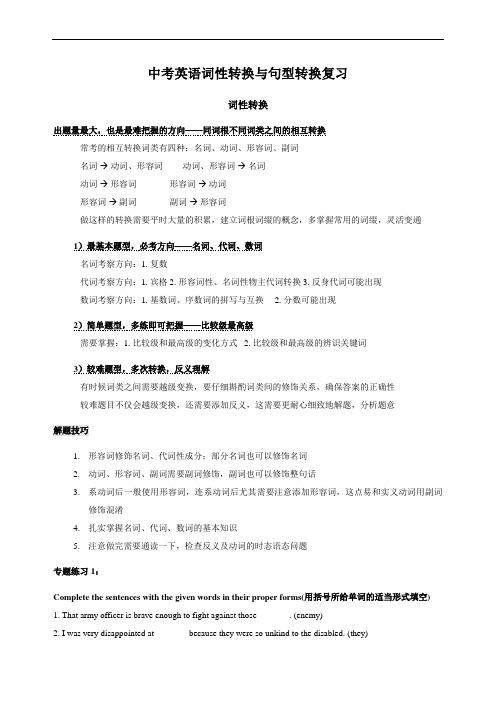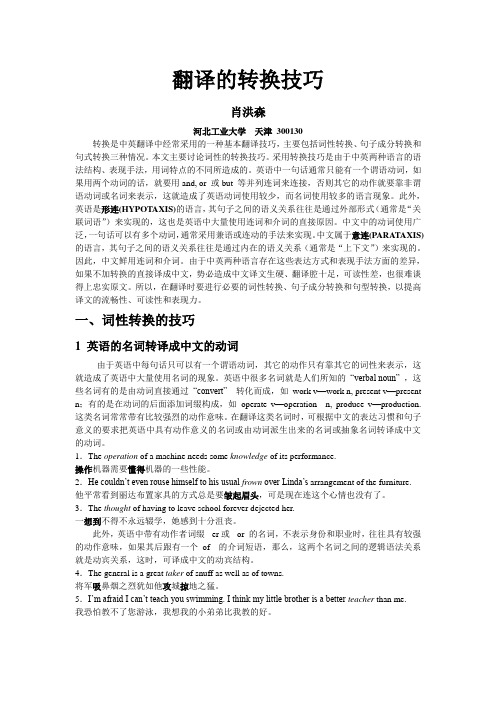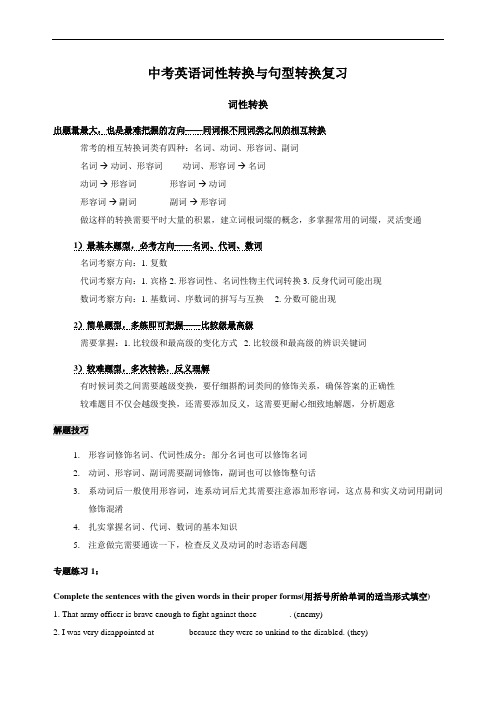词性和句型转换
中考英语词性转换与句型转换复习(含解析)

中考英语词性转换与句型转换复习词性转换出题量最大,也是最难把握的方向——同词根不同词类之间的相互转换常考的相互转换词类有四种:名词、动词、形容词、副词名词→动词、形容词动词、形容词→名词动词→形容词形容词→动词形容词→副词副词→形容词做这样的转换需要平时大量的积累,建立词根词缀的概念,多掌握常用的词缀,灵活变通1)最基本题型,必考方向——名词、代词、数词名词考察方向:1. 复数代词考察方向:1. 宾格 2. 形容词性、名词性物主代词转换 3. 反身代词可能出现数词考察方向:1. 基数词、序数词的拼写与互换 2. 分数可能出现2)简单题型,多练即可把握——比较级最高级需要掌握:1. 比较级和最高级的变化方式 2. 比较级和最高级的辨识关键词3)较难题型,多次转换,反义理解有时候词类之间需要越级变换,要仔细斟酌词类间的修饰关系,确保答案的正确性较难题目不仅会越级变换,还需要添加反义,这需要更耐心细致地解题,分析题意解题技巧1.形容词修饰名词、代词性成分;部分名词也可以修饰名词2.动词、形容词、副词需要副词修饰,副词也可以修饰整句话3.系动词后一般使用形容词,连系动词后尤其需要注意添加形容词,这点易和实义动词用副词修饰混淆4.扎实掌握名词、代词、数词的基本知识5.注意做完需要通读一下,检查反义及动词的时态语态问题专题练习1:Complete the sentences with the given words in their proper forms(用括号所给单词的适当形式填空)1. That army officer is brave enough to fight against those _______. (enemy)2. I was very disappointed at _______ because they were so unkind to the disabled. (they)3. Langping helped the Chinese Women’s Volleyball Team win the gold medal in her _______. (fifty)4. The smart kid is learning to _______ two foreign languages at the same time. (speech)5. Shanghai Disneyland is an _______ park which is popular among visitors. (amusing)6. People show their respect to the _______ policeman for his great deeds. (wound)7. It was surprising that my father dealt with this problem in such a/an _______ way. (usual)8. Traditional Chinese medical treatment is _______ practiced in western countries now. (wide)专题练习2:1.基数词与序数词的互相转换1. Let' s take the lift up to the restaurant on the floor. (twenty)2. Linton is interested in Chinese history and this is his _____ visit to Beijing. (four)3. Our new flat is on the ______ , and we have a good view of the park. (ten)4. Mum made a big chocolate cake for little Kevin’s _____birthday. (six)5. We still need ______more chairs for the meeting room. (ninth)6. Eric, the ______son of the family, has a special interest in physics. (three)7. Alex is _____years old and is taken good care of in the kindergarten. (fourth)8. Climb up to the ___ floor, and you can enjoy a better view. ( eleven)2. 名词变复数1. I received some Christmas _______ from my pen pals. (card)2. The street near my house is always crowded with cars and ______.(bus)3. They bought some _______ at the supermarket yesterday. (potato)4. Many historical ________will be shown on National Day. (movie)5. Joanna received many ______ when graduating from middle school. (gift)6. It is said that eight _____ of water a day can help you keep fit. (glass)3. 人称代词的形式变化1. Billy looks upset. What happened to _____? (he)2. “Would you tell ______ about your trip to Russia?” the children asked Uncle Joe. (we)3. Mandy has got a lovely dog. ______name is Oliver. (It)4. I think the girl is old enough to tie up her shoes by ______. (her)5. Whose school uniform is that on the chair, yours or______? (my)6. Don't worry about your son. He is old enough lo be independent and live by_____. (he)4. 形容词和副词的转换(1)副词转换为形容词1. The exams usually take place at the end of June. (finally)2. On a night, you can see thousands of stars in the sky.(clearly)( 2 )形容词转换为副词1. The children were _____excited when they saw the two pandas, tuantuan and yuanyuan. (real)2. It rained ______ last night and the river rose two feet. (heavy)3 . I can_____ work out the problem. And you? (easy)4. The old lady could hardly believe that she had got the travel pass to Hong Kong so _____. (easy)5. Mary is good at writing. She will _____ be a reporter in the future. (possible)6. Listen! The birds are singing _______ in the woods. (beautiful)7.____, Grace made up her mind to live abroad with her daughter. (final)8. You need to explain your opinions quite ______when having a debate. (clear)9. The young mother is singing ______to her baby son now. (soft)10. With the help of Yellow Pages, we found the address of the theatre _____. (easy)5. 形容词转换为反义词1. It is for an ordinary plane to fly to the moon. (possible)2. Someone thinks the number 13 is an_______number, (lucky)3. It is ______ to improve our English without enough practice.(possible)4. It's ______for him to be so active today as he is always a man of few words. (usual)5.If you don't go on a diet, it is_____for you to lose weight. (possible)6. 名词和形容词之间的转换1. Some famous are going to give lectures in our university in August. (science)2. Lucy looks in Mum's shoes. (fun)3.—What's your________? (national)—Chinese.4.1 don't like the flat here. It's too________.(noise)5. Who's your_______ teacher? (physical)—Mr.Lu.6. Feng Ai’s love and ________ will always be remembered by her students and their parents in Yunnan. (kind)7. The fishermen are told to be more careful on ______ days. (wind)8. More people are getting to know the ________ of environmental protection. (important)9. To be lovely Shanghainese , we should be helpful and ______________ to others. (friend)10. The situation in that country is ______________ . You’d better not go there. (danger)11. It is _______________ of Peter to pay so much money for clothes. (fool)12. Fishing is one of my ________ outdoor activities. (favour)13. The Iraq War has made thousands of children ______________. (home)14. I believe knowledge is more ______________________ than money. (power)15. Shirley has done a lot for the tourists. She is really a ____________ guide. (help)16. It’s difficult for us to tell the ____________ between these two words. (different)17. It was _________ for human beings to predict weather in the past. (difficulty)62. The short play was very ____________ . I laughed from beginning to end. (fun)7. 名词和动词之间的转换1. At the of this century, the APEC conferences were held successfully in Shanghai(begin)2.Telephone_______ are developing very quickly throughout our country.(serve)47. Mr Chen was surprised to see the fast ________ in Shanghai after his long absence from the 3ty. (develop)4 A bus ______ is responsible for the safety of his passengers. (drive)5. I ______ we see a film about the Anti-Japanese War. (suggestion)6. The young man works as a _______ in a five-star hotel. (wait)7. Grandpa is going to ________ his house and live with us. (sale)8. Nowadays too many boys want to become ________. (act)9. The students had a _______ in the English class yesterday. (discuss)10. Put some milk into the flour, break two eggs and then ______ them. (mixture)11. More and more foreigners are learning to _______ Chinese nowadays. (speech)12. Who is the ______ of the book War and Peace? (write)13. It's raining heavily. I'd _____ you call a taxi home now. (suggestion)14. There is a beautiful ______on the wall in each room of my house. (paint)15.local people had to move away because of the serious ______. (pollute)16. Ba Jin is one of the famous_______ in China,8.动词与形容词、副词之间的转换1. Wang Wei, the young pilot, _____for our country. He will live in our hearts forever. (dead)2. In weather, the old had better stay at home.(freeze)3. Many people caught cold last month because of the ________ weather. (change)4. Watch , and you will find the difference between the two pictures. (care)5. ________ food is convenient to cook so it’s a craze in supermarkets. (freeze)6. A group of young Japanese had an _______ tour in our town last month. (enjoy)7. The local people are ________ that the whole nation are helping them rebuild the town. (thank)8. It is a very ____book for language learners lo improve writing skills. (use)9.The movie kungfuPandaII is sure to_____ a large number of teenagers. ( attractive)10. Don’t throw the old watch away. It is still ________. (use)句型转换句型转换考点解析:1. 肯定句变否定句和否定句:常考的考点:have 、do句型2. 反义疑问句:常考的考点:带有否定副词的句子。
(完整版)英语词性转换归纳

英语词性转换归纳动词变名词1.v+ ment 结尾achieve---achievement 成就advertise--- advertisement// advertisingagree— (in )agreementapartment 公寓amusement 娱乐argue---argument争吵commit奉献—commitmentcompliment 称赞,恭维develop---developmentdisgree—disagreementdepartment 局,部experiment 实验,试验equip 装备---equipment 装备,器材govern 统治—government 政府manage---management 经营管理2.V+ tion 结尾attract吸引—attraction 有吸引力的事或人;令人向往的地方conclude—conclusion 结论compete—competition 竞争,比赛discuss—discussion 讨论educate-----educationdecide----decisiondescribe—description描写,描绘express 表达----expression 词语;表达方式graduate 毕业—graduationoperate 操作,动手术—operationorganize----organizationinstruct—instruction 指导,介绍invent—inventor / inventioninvite—invitationinspire---inspiration 灵感,鼓舞人心的---pollute----pollution 污染predict---prediction 预言pronounce ---pronunciationresolve 决心-----resolution 决心permit 允许-----permissionsuggest-建议,暗示--suggestionsolve解决-----solution 解决方法3.V+ ance 结尾appear—appearance 外貌,出现perform----performance 演出4.V+ ing 结尾bathe 洗澡---bathingend 结束----ending 结尾,结局train 训练---trainingmean ---- meaning 意义say-----saying 谚语5.V+ 其他Beg(乞讨)—beggar 乞丐behave 行为,举止----behaviorknow---knowledgefly—flight 飞行heat 加热---heat 热量hit 撞击------hit 轰动一时的人或物,碰撞mix 混合-----mixture 混合物press 按,压—pressure 压力sit-----seat 座位succeed-- successtour 在-----旅游,在-----作巡回演出直接+地点 tour China ---tour 旅游/ tourist 游客名词变形容词1名词+yAnger 生气-----angryhunger---hungryfog—foggy有雾的fur----furry 毛皮的guilt 罪恶---guilty 内疚的health---healthyluck---luckycloud---cloudywind—windyrain---rainysnow---snowysun—sunnytourist------touristy 游客多的business---busysalt 盐--- salty 咸的shine---shiny 发亮的silk 丝绸—silky 丝绸般的sleep---sleepy 昏昏欲睡的taste 口味,品味------tasty 甜的2.名词+ edbalance –balanced 平衡的spot 斑点,地点----spotted 有斑点的talent-----talented 有天赋的organized 有组织的distusted 厌恶的offended 生气的crowded 拥挤的polluted 被污染的pleased 高兴的3.名词+ ful/lessmeaning—meaningful 有意义的care—careful/ careless 小心的;粗心的help---helpful / helpless home—homeless 无家可归的colour---colourfulpain 疼痛---painful 痛苦的use---useless/ usefulthank—thankful 充满感激的peace 和平 ---- peaceful 平静的,宁静的playful 顽皮的,爱玩耍的4.名词+ ableadjustable 可调整的comfort---comfortableknowledge---knowledgeablesuit 一套-----suitable 合适的5.名词+ ousenormous 巨大的danger—dangerousmystery 神秘-----mysterious 神秘的6.ce 变 tconfidence----confidentdifference---different7. al 结尾medicine 药----medical 医学的music---musicalnature---natural 自然的person---personal (私人的) nation—national 国家的education---educational有教育意义的tradition----traditional 传统的origin起源---original 新颖的;独创的8.名词+ lyfriend—friendlylive---lively 活跃的,有生气的love—lovely 可爱的9.+ en 结尾wood—wooden 木制的wool—woolen 羊毛的10. 其他energy精力---energeticfool 傻子—foolish 愚蠢的freedom 自由—free 空的,免费的height 高度—highillness 疾病--- illlove—loving 慈爱的death---deadpleasure---pleasant / pleased popularity 流行性—popularpride---proudscientist----scientific 科学的方位的词表达名词—形容词East—easternWest—westernSouth—southernNorth---northernIn the west of ChinaIn the western part of China四大洲名词-----形容词Asia 亚洲–---- AsianAfrica 非洲----- AfricanEurope欧洲----- EuropeanAmerica 美洲-----American形容词变副词1.形容词+ lybad—badlybright—brightly 明亮地casual—casually 随意地clear—clearly 清楚地complete—completely 完全correct---correctly 正确地final--finallyfortunate—fortunately幸运地general—generally 一般来讲loud—loudlyparticular 特殊的,独特的—particularly polite—politelyproper 合适的-,恰当的---properlymain------mainly 主要地most 多数-----mostly 多半,大多数normal---normally 正常地quick—quicklyquiet—quietly 轻轻地,安静地real—reallyrecent 最近的----recently 最近;近来hard 难的;努力地---hardly 几乎不late 迟的—lately 最近;近来sad--sadlyslow---slowlyspecial—specially 专门,特殊地specific---specifically 特定地,明确地strong—strongly 坚决地,强烈地sudden—suddenly突然usual—usually2. 以le 结尾的去e + ycomfortable---comfortablygentle—gentlypossible---possiblysimple ----simply 仅仅;只;简单地terrible---terribly3. 辅音字母+ y 变 ilyeasy—easilyheavy—heavilyhappy--happily4.特殊good—well好地 well 身体健康的,井true—truly名词---形容词—副词beauty 美,美人—beautiful—beautifully care—careful—carefully care—careless—carelesslydifference---different---differently happiness—happy—happily hunger—hungry--hungrily health—healthy—healthily luck—lucky—luckily noise—noisy—noisily pride—proud—proudly骄傲地sadness—sad—sadlysafety 安全;安全的地方—safe—safely silence—silent---silently 默默地success—successful—successfully truth—true—truly unluck—unlucky—unluckilywonder 奇迹—wonderful—wonderfully既是形容词又是副词early get up early ;an early trainlate be late for classcome late for schooldeep dive deep into the seaa hole deep largehigh jump high;a high mountainhard a hard question;a hard stone work hard / study hardrain hardlong It takes too longIt takes a long timefar jump farMy home is far from school straight a straight linego straight along here(1)v.-n.动词转化为名词,post-postage mail-mailweigh-weight advise-advice(2)v.-n.-a.动词转化成名词-形容词act-actor / actress-activechange-change-changeable(3) v.-a.-ad.-n.动词转化成形容词,副词,名词fill-fullneed-necessary-necessarilyinterest(v. / n.) interested /interesting (4)n. a. n. a.名词转化为形容词person personal ( 个人的; 私人的)fun funny(5)n. pl. n. pl.名词转化为名词复数gentleman gentlemen human humans(6)a. ad. a. ad.形容词转化为副词possible possibly probable probably(7)a. ad. n.形容词转化为副词,名词true truly truthlucky luckily luck(8)原级比较级最高级far farther / further farthest / furthestlittle less least一、名词变为形容词的方法1. 在名词后面加-y可以变成形容词(尤其是一些与天气有关的名词)。
词性转换的技巧

翻译的转换技巧肖洪森河北工业大学天津300130转换是中英翻译中经常采用的一种基本翻译技巧,主要包括词性转换、句子成分转换和句式转换三种情况。
本文主要讨论词性的转换技巧。
采用转换技巧是由于中英两种语言的语法结构、表现手法,用词特点的不同所造成的。
英语中一句话通常只能有一个谓语动词,如果用两个动词的话,就要用and, or 或but 等并列连词来连接,否则其它的动作就要靠非谓语动词或名词来表示,这就造成了英语动词使用较少,而名词使用较多的语言现象。
此外,英语是形连(HYPOTAXIS)的语言,其句子之间的语义关系往往是通过外部形式(通常是“关联词语”)来实现的,这也是英语中大量使用连词和介词的直接原因。
中文中的动词使用广泛,一句话可以有多个动词,通常采用兼语或连动的手法来实现。
中文属于意连(PARAT AXIS)的语言,其句子之间的语义关系往往是通过内在的语义关系(通常是“上下文”)来实现的。
因此,中文鲜用连词和介词。
由于中英两种语言存在这些表达方式和表现手法方面的差异,如果不加转换的直接译成中文,势必造成中文译文生硬、翻译腔十足,可读性差,也很难谈得上忠实原文。
所以,在翻译时要进行必要的词性转换、句子成分转换和句型转换,以提高译文的流畅性、可读性和表现力。
一、词性转换的技巧1 英语的名词转译成中文的动词由于英语中每句话只可以有一个谓语动词,其它的动作只有靠其它的词性来表示,这就造成了英语中大量使用名词的现象。
英语中很多名词就是人们所知的“verbal noun”,这些名词有的是由动词直接通过“convert”转化而成,如work v—work n, present v—present n;有的是在动词的后面添加词缀构成,如operate v—operation n, produce v—production.这类名词常常带有比较强烈的动作意味。
在翻译这类名词时,可根据中文的表达习惯和句子意义的要求把英语中具有动作意义的名词或由动词派生出来的名词或抽象名词转译成中文的动词。
句子的转换有多少种类型的方法

句子的转换有多少种类型的方法句子是人们在交流中使用的最基本的语言单位,它由主语、谓语、宾语、定语和状语等要素构成。
在语文学习中,句子转换是一项非常重要的技能,它不仅可以帮助我们掌握语言的表达能力,还可以提高我们的语文水平。
本文将会探讨句子的转换有多少种类型的方法,并且列举三个例子,写700字,以此帮助学生更好地掌握句子转换技巧。
句子的转换有很多种类型的方法,下面我们将会介绍其中的六种。
1. 句型转换句型转换是句子转换的最基本方法,它是将一个句子的结构转化为另一个句型的结构,从而增强句子的表达效果。
例如:原句:小明正在做作业。
句型转换:作业正在被小明做着。
这个例子中,我们将原句子中的主语“小明”变为被动语态的主语,同时将谓语“正在做”改为被动语态的谓语“正在被做着”。
2. 词性转换词性转换是指将一个词的词性从一种转换为另一种,以达到改变句子意思的目的。
例如:原句:猫在桌子上睡觉。
词性转换:在桌子上,猫睡觉。
这个例子中,我们将原句子中的“在”、“上”这两个介词转化为副词的形式,放到了句首,从而表达出在桌子上猫睡觉的情况。
3. 反义转换反义转换是指将原本一个句子的含义发生反转。
例如:原句:那个男孩非常高兴。
反义转换:那个男孩非常不幸。
这个例子中,我们将原句子中的“高兴”一词反义成“不幸”,突出了语言表达的反差效果。
以上是句子转换中的三种方法,下面我们再来看看另外三种方法。
4. 转换时态转换时态是指将一个句子的时态从一种转换为另一种,以达到改变句意的目的。
例如:原句:昨天早上我在打电话。
转换时态:明天早上我将在打电话。
这个例子中,我们将原句子中的“昨天”和“现在”全部改为“将来”,从而表达明天早上我将会打电话,这样更加准确地传达了信息。
5. 转换语气转换语气是指将一个句子的语气从一种转换为另一种,以达到改变句意的目的。
例如:原句:今年的科技进步非常快。
转换语气:今年的科技进步并非快。
这个例子中,我们将原句子中的肯定语气转化为否定语气,突出了“非常”这个程度副词的加强效果。
高考英语词性转换知识点精编版

高考英语词性转换知识点精编版1.名词转动词名词转动词的方法一般有以下几种:1) 加-ing:常见的词性转换方式就是将名词加上-ing后即可转换为动词,表示正在进行的动作或状态。
例如:truth(名词,真理)→truth-ing(动词,查找真相)2) 加-ize或-ify:有些名词在转换为动词时需要添加-ize或-ify 后缀。
例如:apology(名词,道歉)→apologize(动词,道歉);beauty(名词,美丽)→beautify(动词,美化)3) 加-ize变化:有些名词转动词时直接加-ize后缀。
例如:organize(名词,组织)→organize(动词,组织)2.形容词转副词形容词转副词的方法一般有以下几种:1) 加-ly:常见的词性转换方式就是将形容词加上-ly后即可转换为副词。
例如:quick(形容词,快的)→quickly(副词,快速地)2) 不加后缀:有些形容词可以直接转换为副词,不需要添加后缀。
例如:fast(形容词,快的)→fast(副词,快速地)3.动词转名词动词转名词的方法一般有以下几种:1) 加-ing:常见的词性转换方式就是将动词加上-ing后即可转换为名词,表示该动作的状态或结果。
例如:paint(动词,绘画)→painting(名词,绘画)2) 加-er:有些动词转换为名词时需要添加-er后缀,表示该动词的展现者或从事者。
例如:teach(动词,教)→teacher(名词,教师)3) 加-ion或-ment:有些动词转换为名词时需要添加-ion或-ment后缀。
例如:inform(动词,通知)→information(名词,信息)4.形容词转名词形容词转名词的方法一般有以下几种:1) 加-ness:常见的词性转换方式就是将形容词加上-ness后即可转换为名词,表示该形容词的性质或状态。
例如:kind(形容词,友善的)→kindness(名词,友善)2) 不加后缀:有些形容词可以直接转换为名词,不需要添加后缀。
英语词性转换归纳

英语词性转换归纳在英语学习中,词性转换是一个非常重要的知识点。
它不仅能够帮助我们更准确地理解单词的含义,还能让我们在写作和表达中更加灵活地运用词汇。
下面就来对英语中的词性转换进行一个归纳总结。
一、名词转换为动词很多名词都可以通过添加特定的后缀或改变词形来转换为动词。
例如,“hand”作为名词是“手”的意思,而“hand in”则是动词短语,表示“上交”。
“face”作为名词是“脸”,“face the problem”就是“面对问题”,此时“face”用作动词。
还有一些名词通过词形变化转换为动词,比如“water”,作名词是“水”,作动词表示“浇水”;“rain”,名词是“雨”,动词则是“下雨”。
二、动词转换为名词动词转换为名词的方式也多种多样。
常见的是在动词后加上“ion”“ment”“ance”“ence”等后缀。
例如,“decide”(决定)变成“decision”(决定);“develop”(发展)变成“development”(发展);“appear”(出现)变成“appearance”(出现;外表);“refer”(参考;提及)变成“reference”(参考;提及;参考书目)。
有的动词通过词形变化成为名词,比如“fly”(飞)变成“flight”(飞行;航班);“choose”(选择)变成“choice”(选择)。
三、形容词转换为动词形容词转换为动词相对较少,但也有一些常见的例子。
比如,“empty”,作形容词是“空的”,用作动词表示“使……空”。
“slow”作形容词是“慢的”,“slow down”则是“(使)减速”。
四、形容词转换为名词形容词转换为名词的情况比较常见。
可以在形容词后加上“ness”“ity”“th”等后缀。
例如,“happy”(快乐的)变成“happiness”(快乐);“able”(能够的)变成“ability”(能力);“wide”(宽的)变成“width”(宽度);“long”(长的)变成“length”(长度)。
中考英语词性转换与句型转换复习(含参考答案)

中考英语词性转换与句型转换复习词性转换出题量最大,也是最难把握的方向——同词根不同词类之间的相互转换常考的相互转换词类有四种:名词、动词、形容词、副词名词→动词、形容词动词、形容词→名词动词→形容词形容词→动词形容词→副词副词→形容词做这样的转换需要平时大量的积累,建立词根词缀的概念,多掌握常用的词缀,灵活变通1)最基本题型,必考方向——名词、代词、数词名词考察方向:1. 复数代词考察方向:1. 宾格 2. 形容词性、名词性物主代词转换 3. 反身代词可能出现数词考察方向:1. 基数词、序数词的拼写与互换 2. 分数可能出现2)简单题型,多练即可把握——比较级最高级需要掌握:1. 比较级和最高级的变化方式 2. 比较级和最高级的辨识关键词3)较难题型,多次转换,反义理解有时候词类之间需要越级变换,要仔细斟酌词类间的修饰关系,确保答案的正确性较难题目不仅会越级变换,还需要添加反义,这需要更耐心细致地解题,分析题意解题技巧1.形容词修饰名词、代词性成分;部分名词也可以修饰名词2.动词、形容词、副词需要副词修饰,副词也可以修饰整句话3.系动词后一般使用形容词,连系动词后尤其需要注意添加形容词,这点易和实义动词用副词修饰混淆4.扎实掌握名词、代词、数词的基本知识5.注意做完需要通读一下,检查反义及动词的时态语态问题专题练习1:Complete the sentences with the given words in their proper forms(用括号所给单词的适当形式填空)1. That army officer is brave enough to fight against those _______. (enemy)2. I was very disappointed at _______ because they were so unkind to the disabled. (they)3. Langping helped the Chinese Women’s Volleyball Team win the gold medal in her _______. (fifty)4. The smart kid is learning to _______ two foreign languages at the same time. (speech)5. Shanghai Disneyland is an _______ park which is popular among visitors. (amusing)6. People show their respect to the _______ policeman for his great deeds. (wound)7. It was surprising that my father dealt with this problem in such a/an _______ way. (usual)8. Traditional Chinese medical treatment is _______ practiced in western countries now. (wide)专题练习2:1.基数词与序数词的互相转换1. Let' s take the lift up to the restaurant on the floor. (twenty)2. Linton is interested in Chinese history and this is his _____ visit to Beijing. (four)3. Our new flat is on the ______ , and we have a good view of the park. (ten)4. Mum made a big chocolate cake for little Kevin’s _____birthday. (six)5. We still need ______more chairs for the meeting room. (ninth)6. Eric, the ______son of the family, has a special interest in physics. (three)7. Alex is _____years old and is taken good care of in the kindergarten. (fourth)8. Climb up to the ___ floor, and you can enjoy a better view. ( eleven)2. 名词变复数1. I received some Christmas _______ from my pen pals. (card)2. The street near my house is always crowded with cars and ______.(bus)3. They bought some _______ at the supermarket yesterday. (potato)4. Many historical ________will be shown on National Day. (movie)5. Joanna received many ______ when graduating from middle school. (gift)6. It is said that eight _____ of water a day can help you keep fit. (glass)3. 人称代词的形式变化1. Billy looks upset. What happened to _____? (he)2. “Would you tell ______ about your trip to Russia?” the children asked Uncle Joe. (we)3. Mandy has got a lovely dog. ______name is Oliver. (It)4. I think the girl is old enough to tie up her shoes by ______. (her)5. Whose school uniform is that on the chair, yours or______? (my)6. Don't worry about your son. He is old enough lo be independent and live by_____. (he)4. 形容词和副词的转换(1)副词转换为形容词1. The exams usually take place at the end of June. (finally)2. On a night, you can see thousands of stars in the sky.(clearly)( 2 )形容词转换为副词1. The children were _____excited when they saw the two pandas, tuantuan and yuanyuan. (real)2. It rained ______ last night and the river rose two feet. (heavy)3 . I can_____ work out the problem. And you? (easy)4. The old lady could hardly believe that she had got the travel pass to Hong Kong so _____. (easy)5. Mary is good at writing. She will _____ be a reporter in the future. (possible)6. Listen! The birds are singing _______ in the woods. (beautiful)7.____, Grace made up her mind to live abroad with her daughter. (final)8. You need to explain your opinions quite ______when having a debate. (clear)9. The young mother is singing ______to her baby son now. (soft)10. With the help of Yellow Pages, we found the address of the theatre _____. (easy)5. 形容词转换为反义词1. It is for an ordinary plane to fly to the moon. (possible)2. Someone thinks the number 13 is an_______number, (lucky)3. It is ______ to improve our English without enough practice.(possible)4. It's ______for him to be so active today as he is always a man of few words. (usual)5.If you don't go on a diet, it is_____for you to lose weight. (possible)6. 名词和形容词之间的转换1. Some famous are going to give lectures in our university in August. (science)2. Lucy looks in Mum's shoes. (fun)3.—What's your________? (national)—Chinese.4.1 don't like the flat here. It's too________.(noise)5. Who's your_______ teacher? (physical)—Mr.Lu.6. Feng Ai’s love and ________ will always be remembered by her students and their parents in Yunnan. (kind)7. The fishermen are told to be more careful on ______ days. (wind)8. More people are getting to know the ________ of environmental protection. (important)9. To be lovely Shanghainese , we should be helpful and ______________ to others. (friend)10. The situation in that country is ______________ . You’d better not go there. (danger)11. It is _______________ of Peter to pay so much money for clothes. (fool)12. Fishing is one of my ________ outdoor activities. (favour)13. The Iraq War has made thousands of children ______________. (home)14. I believe knowledge is more ______________________ than money. (power)15. Shirley has done a lot for the tourists. She is really a ____________ guide. (help)16. It’s difficult for us to tell the ____________ between these two words. (different)17. It was _________ for human beings to predict weather in the past. (difficulty)62. The short play was very ____________ . I laughed from beginning to end. (fun)7. 名词和动词之间的转换1. At the of this century, the APEC conferences were held successfully in Shanghai(begin)2.Telephone_______ are developing very quickly throughout our country.(serve)47. Mr Chen was surprised to see the fast ________ in Shanghai after his long absence from the 3ty. (develop)4 A bus ______ is responsible for the safety of his passengers. (drive)5. I ______ we see a film about the Anti-Japanese War. (suggestion)6. The young man works as a _______ in a five-star hotel. (wait)7. Grandpa is going to ________ his house and live with us. (sale)8. Nowadays too many boys want to become ________. (act)9. The students had a _______ in the English class yesterday. (discuss)10. Put some milk into the flour, break two eggs and then ______ them. (mixture)11. More and more foreigners are learning to _______ Chinese nowadays. (speech)12. Who is the ______ of the book War and Peace? (write)13. It's raining heavily. I'd _____ you call a taxi home now. (suggestion)14. There is a beautiful ______on the wall in each room of my house. (paint)15.local people had to move away because of the serious ______. (pollute)16. Ba Jin is one of the famous_______ in China,8.动词与形容词、副词之间的转换1. Wang Wei, the young pilot, _____for our country. He will live in our hearts forever. (dead)2. In weather, the old had better stay at home.(freeze)3. Many people caught cold last month because of the ________ weather. (change)4. Watch , and you will find the difference between the two pictures. (care)5. ________ food is convenient to cook so it’s a craze in supermarkets. (freeze)6. A group of young Japanese had an _______ tour in our town last month. (enjoy)7. The local people are ________ that the whole nation are helping them rebuild the town. (thank)8. It is a very ____book for language learners lo improve writing skills. (use)9.The movie kungfuPandaII is sure to_____ a large number of teenagers. ( attractive)10. Don’t throw the old watch away. It is still ________. (use)句型转换句型转换考点解析:1. 肯定句变否定句和否定句:常考的考点:have 、do句型2. 反义疑问句:常考的考点:带有否定副词的句子。
三年级语文学习正确的语法用法

三年级语文学习正确的语法用法语文学习的正确语法用法是三年级学生需要掌握的基本知识之一。
掌握正确的语法用法,不仅可以提高语文作文的质量,还可以帮助学生更好地理解课文和进行阅读理解。
本文将从词性、句子结构和标点符号等方面,详细介绍三年级语文学习中的正确语法用法。
一、词性的正确使用在语文学习中,词性的正确使用是非常重要的。
常见的词性包括名词、动词、形容词、副词和介词等。
学生们应该学会辨认不同词性的词汇,并能够正确运用它们。
1. 名词的正确用法名词是指人、事物、地方、时间等的名称。
在句子中,名词可以作主语、宾语、定语或者表语等。
例如:- 主语:小明是聪明的孩子。
- 宾语:我喜欢读书。
- 定语:红色的花是最美丽的。
- 表语:奶奶是我们的宝贝。
学生们需要注意名词的单数和复数形式以及所有格的变化。
此外,还要掌握可数名词和不可数名词的用法区别。
例如:- 单数和复数形式:猫(单数)→猫(复数)、手(单数)→手(复数)- 所有格的变化:小明的书、孩子们的玩具2. 动词的正确用法动词是表示动作或状态的词汇,常用动词有“看、听、吃、喝、跑”等。
学生们需要掌握动词的时态、语态和句型转换等知识点。
- 时态:一般现在时、一般过去时、一般将来时等。
例如,I play(一般现在时)、I played(一般过去时)、I will play(一般将来时)- 语态:主动语态和被动语态。
例如,The boy kicked the ball(主动语态)、The ball was kicked by the boy(被动语态)- 句型转换:陈述句、疑问句、祈使句和感叹句的转换。
例如,Heis a teacher(陈述句)、Is he a teacher?(疑问句)、Be a teacher!(祈使句)、What a good teacher he is!(感叹句)3. 形容词和副词的正确用法形容词是修饰名词的词汇,常用形容词有“好、大、小、快、慢”等。
- 1、下载文档前请自行甄别文档内容的完整性,平台不提供额外的编辑、内容补充、找答案等附加服务。
- 2、"仅部分预览"的文档,不可在线预览部分如存在完整性等问题,可反馈申请退款(可完整预览的文档不适用该条件!)。
- 3、如文档侵犯您的权益,请联系客服反馈,我们会尽快为您处理(人工客服工作时间:9:00-18:30)。
词性和句型转换
一,名词:
1.可数名词: a.一般加s, b.以s,sh,ch,x,o结尾的加es, c.以辅音字
母加y结尾的变y为i再加es, d.oo变ee, f.以f, fe结尾的变f, fe 为ves. g.特殊:man-men. woman-women, child-children. h. 单复数同形。
J.国家:中日不变,英法变,德美加s.
2.不可数名词(没有单复数形式, 所以谓语动词用单数)
二,动词:
1.第三人称单数,
2.现在进行时,
3.过去式,
4.过去分词,
三,形容词、副词:
形容词和副词有比较级和最高级
1.一般在词尾加er,est
2.以e结尾的形容词加r,st
3.以辅音字母加y结尾的,变y为i再加er,est.
4.双写加er,est
5.特殊:两多两坏并良好,还有一远和一少。
6.比较级的标志:than, a little, a lot, even, much.
四,介词:具体的时间要用on
五,数词:
1.基数词:十五,十九,四十,九十
2.序数词:
一,二,三要牢记,其余th加后面;
Th里面有例外,你要格外记明白;
八去t,九去e, ve要用f替
几十把y变ie, 跟着再加th.
一,一般疑问句
1.有:be 动词(is am are was were)情态动词(will would can could
may might should shall)have has时,把它们提起,其余照抄,结尾加问号。
2.没有这些时:a.把do提起,其余照抄,结尾加问号。
b.把does提起,其余照抄,结尾加问号。
c.把did 提起,其余照抄,结尾加问号。
注:1.别忘了把第一人称改第二人称。
2.把some-any. Something-anything .and-or。
一,否定句
1.有:be 动词(is am are was were)情态动词(will would can could
may might should shall)have has时,在后面加not,其余照抄.
2.没有这些时:a.在主语后面加don’t,其余照抄.
b.在主语后面加doesn’t,别忘了把动词改动词原形,其余照抄。
c.在主语后面加didn’t,别忘了把动词改动词原形,
其余照抄.
注:把some-any. something-anything .and-or
二,特殊疑问句=疑问词+一般疑问句
疑问词有:how, how old, how often, how soon, how long, how far, how many+可数名词的复数How much,What. What color. What class. What grade. Where, which,
三,反义疑问句
1.祈使句无论是肯定还是否定都用will you
2.let’s 用shall we
3.let us 用will you
4.一些否定词有:few, little, never, no, nothing, hardly. Too…to.。
